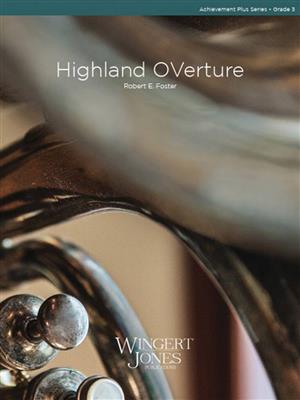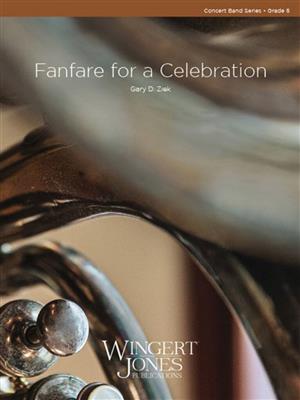Results
-
£82.50
Fantasy On A Welsh Folksong - Robert E. Foster
A beautiful treatment of the well-known Welsh folksong, All Through the Night, this work features chorale settings of this theme through the various brass and woodwind choirs as it builds and develops. There is an exciting climax utilizing the resources and power of the entire band before a return to the quiet, serene and effective ending.
Estimated dispatch 7-14 working days
-
 £82.50
£82.50Freedom Overture - John Edmondson
Commissioned by a junior high band in Mesa, Arizona, the work is playable by bands with limited instrumentation and experience. A maestoso primo section is followed by a lyrical 3/4 movement featuring woodwinds. A return to the original theme is heard with an expanded tutti finale. An excellent choice for program or contest.
Estimated dispatch 7-14 working days
-
 £121.00
£121.00Celebration At Lake Sequoia - Gary P. Gilroy
Gilroy composed this festive work to commemorate the Twentieth Anniversary of the Lake Sequoia Symphonic Music Camp. It is an energetic work which is meant to evoke the spirit of celebration, the beauty of the area, the music camp, and its teachers. Beginning with a brilliant fast section, this is followed by a more serene, introspective section with lyrical lines and soloistic playing in the oboe, horns, and trumpet. Wh then return to the festive tempo for a rousing finale.
Estimated dispatch 7-14 working days
-
 £82.50
£82.50Highland Overture - Robert E. Foster
This exciting original overture for young band opens with a bold, majestic fanfare followed by a sudden increase in tempo and changes of texture. A quiet interlude and a return to the majestic fanfare leads to a stirring ending. (4:00)
Estimated dispatch 7-14 working days
-
 £71.50
£71.50Heartland - Larry R. Blocher
This simple, expressive setting was written for a performance at the World War II Veterans Memorial in Washington, D.C. It is symbolic of a generation of Americans who defended their country with honor and passion, expecting nothing in return. Very moving.
Estimated dispatch 7-14 working days
-
 £71.50
£71.50Step Right Up - David Gorham
The carnival is back in town! From the writer that brought us The Fortune Tellers Daughter, here is a return to all the atmosphere and allure of exotic sights, thrilling rides and amazing games of skill. All you need to do is step right up and get your ticket for delightful programming for young bands!
Estimated dispatch 7-14 working days
-
 £104.50
£104.50Heart Of The City - Gary P. Gilroy
The energy generated by this work is virtually electric! This most singular work is alive with the spirit and sounds of New York City. One can sense the busy sidewalks, the zooming traffic and the "cool" side as a sultry alto saxophone solo transports the listener to one of the citys jazz clubs. A return of the opening musical material takes you to the streets and drives relentlessly to an intensely satisfying conclusion!
Estimated dispatch 7-14 working days
-
 £121.00
£121.00Dances For Sem Yeto - Gary P. Gilroy
Commissioned and premiered by the Solano County Honor Band Association to commemorate their 50th anniversary with the composer conducting. Mysterious samplings from the percussion section open while an American Indian flute presents the first theme. As with other works by Gilroy, the composition explores an extensive variety of percussion timbres to keep the piece interesting and always changing. After the introduction, the spirit of the work changes to a lively and festive dance with constantly changing meters which makes the piece come alive. This then winds down to an Indian lullaby, the simple and pensive melody providing a relaxing and welcome change before a dramatic a return to the original festive dance with a slightly modified setting. The final moments of the work are quite fierce with bold and intense percussion accompanying tight harmonies and complex rhythms for an exciting and driving ending..
Estimated dispatch 7-14 working days
-
 £82.50
£82.50Flight Of The Vampire - John Prescott
Take to the skies as a vampire searches intently for his next victim in this exciting work. Using a minor key and repeated eighth notes, a sense of suspense and expectation is created. A shift to major keys provides the listener a momentary illusion of safety and well-being. This quickly ends with a return to the opening material as the chase ensues until dark skies prevail, the vampire emerges victorious and night comes to a close.
Estimated dispatch 7-14 working days
-
 £121.00
£121.00Fanfare For A Celebration - Gary D. Ziek
Fanfare for a Celebration is a festive work, suitable for any jubilant occasion. The piece begins with a sense of anticipation that builds to the spirited fanfare. After this, the tempo slows as the mood changes to a more dignified and stately version of the opening motif played in a legato style. This section progresses to a return of the fanfare that brings the piece to a triumphant conclusion. There is also a cut which allows for effective performance in a shortened version.
Estimated dispatch 7-14 working days
